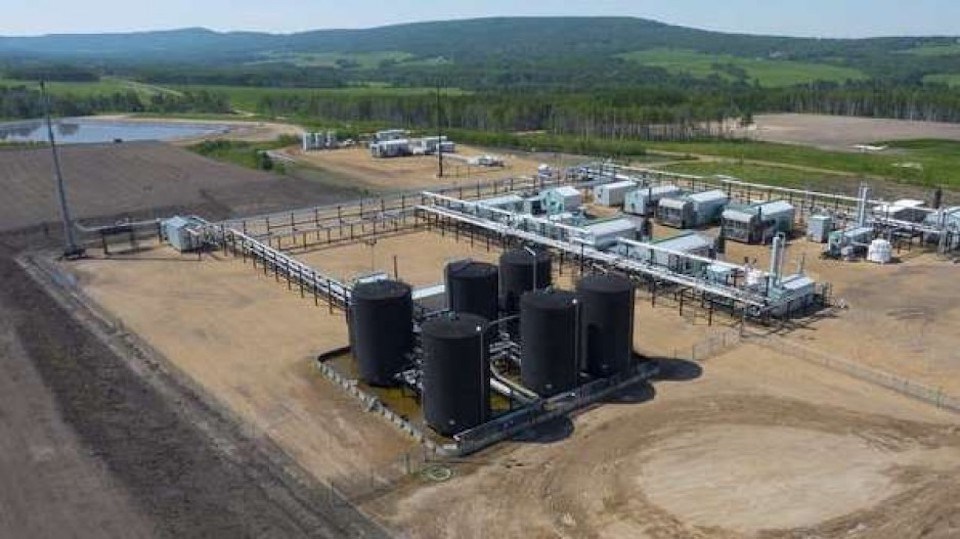Geoscience BC traditionally has done geological science for the benefit of mineral exploration and natural gas sectors in B.C.
But in probing the earth for things like natural gas deposits, it also found hot aquifers that would be ideal for generating geothermal energy, which can produce both heat and electricity.
Thanks to Geoscience BC’s work on that score, the Fort Nelson First Nation is now developing the Clarke Lake geothermal energy project.
That is just one decarbonisation and clean energy projects highlighted Tuesday at the annual BC Natural Resources Forum during a session called Pathways to Decarbonisation.
Another example is a biocrude project involving -- of all things -- a forestry company.
Last year, Canfor Corp. (TSX:CFP) partnered with Australia’s Licella Fibre Fuels Pty Ltd. to form a new joint venture, Arbios Biotech, that will use wood waste to produce “biocrude” at a Canfor pulp and paper mill in Prince George.
“In time, we envision opportunities to produce specialty chemicals and biomaterials,” said Ben Goodier, head of bio-innovation for Canfor
Other examples highlighted Tuesday included FortisBC’s efforts to increase the use of natural gas in transportation as an alternative to fuels like diesel and bunker fuel, and its increased use of renewable natural gas to lower the carbon content of the gas used to heat homes in B.C.
Renewable natural gas is generally methane captured from landfills, sewage treatment plants or agricultural waste.
“This past year, we had the first demonstration of running renewable gas in a ship,” said David Bennett, FortisBC’s director of renewable gas and low carbon fuels. “So Seaspan ran their ship for a week on renewable LNG."
“We initially started out with bio-methane, now we’re looking at other gases,” Bennett said. “We think hydrogen’s going to be an increasingly important part of the picture.”
Despite being a fossil fuel, natural gas will continue to play an important role in decreasing global CO2 and methane emissions, due to its lower carbon content.
When it displaces coal in thermal power production, it can cut CO2 emissions in half. And as the energy crisis gripping Europe has demonstrated, it is the go-to backstop for unreliable wind and solar power.
“We think natural gas is here for the long term,” said Scott Volk, technology and Innovation lead at Tourmaline Oil Corp. (TSX:TOU).
“It will be a feedstock for hydrogen in the longer term, and I’m not sure people really totally got their heads around that yet. We are starting to see the emergence of things like blue hydrogen projects in Alberta.”
Tourmaline is now Canada’s largest natural gas producer and a big player in the B.C. Montney formation in northeastern B.C. The company has made strides in lowering to the GHG intensity of its operations through better measurement and reduction of fugitive methane emissions.
“With all that work we have been doing, we have actually hit our target three years early,” Volk said. “We have a 25 per cent reduction in emissions to 2013 levels that we hit already.”
The company has also reduced CO2 emissions and implemented energy efficiency measures, like 32 waste heat recovery units in its natural gas transmission and processing system.
“That makes up to 42 megawatts of ‘free heat’ that can run our operations, which is purely coming out of efficiency.”
The company also has displaced a lot of diesel fuel in its vehicles and machinery by using the natural gas the company produces, or electricity.
“We’re displacing over 1.4 million litres of diesel fuel per year in our own operations,” Volk said. “To date we’ve displaced over 15 million litres of diesel fuel.”
Several of the panelists acknowledged the role carbon taxes, low carbon fuel standards and other climate change policies enacted in B.C. and elsewhere are playing in pushing industry towards lower carbon innovations.
“The big shift that we anticipate here is that, as energy becomes more expensive, and as carbon is given a greater value, marginal products that are uneconomic today will become much more economic,” Goodier said.
“I think the policies are working,” Volk said. “And I wouldn’t necessarily go and complain too much about the policies putting us at a disadvantage. But we're at a critical point now.
“We've put a price on carbon, we're starting to find ways to build value for carbon. We’re going to start putting Canada at a disadvantage if we go too much further. I would say policies are working, but we need to be very careful and it's not a time to just dump a whole bunch more hard policy restrictions on it (the industry). Now is the time to find a way to take advantage of the policies we’ve already got.”




